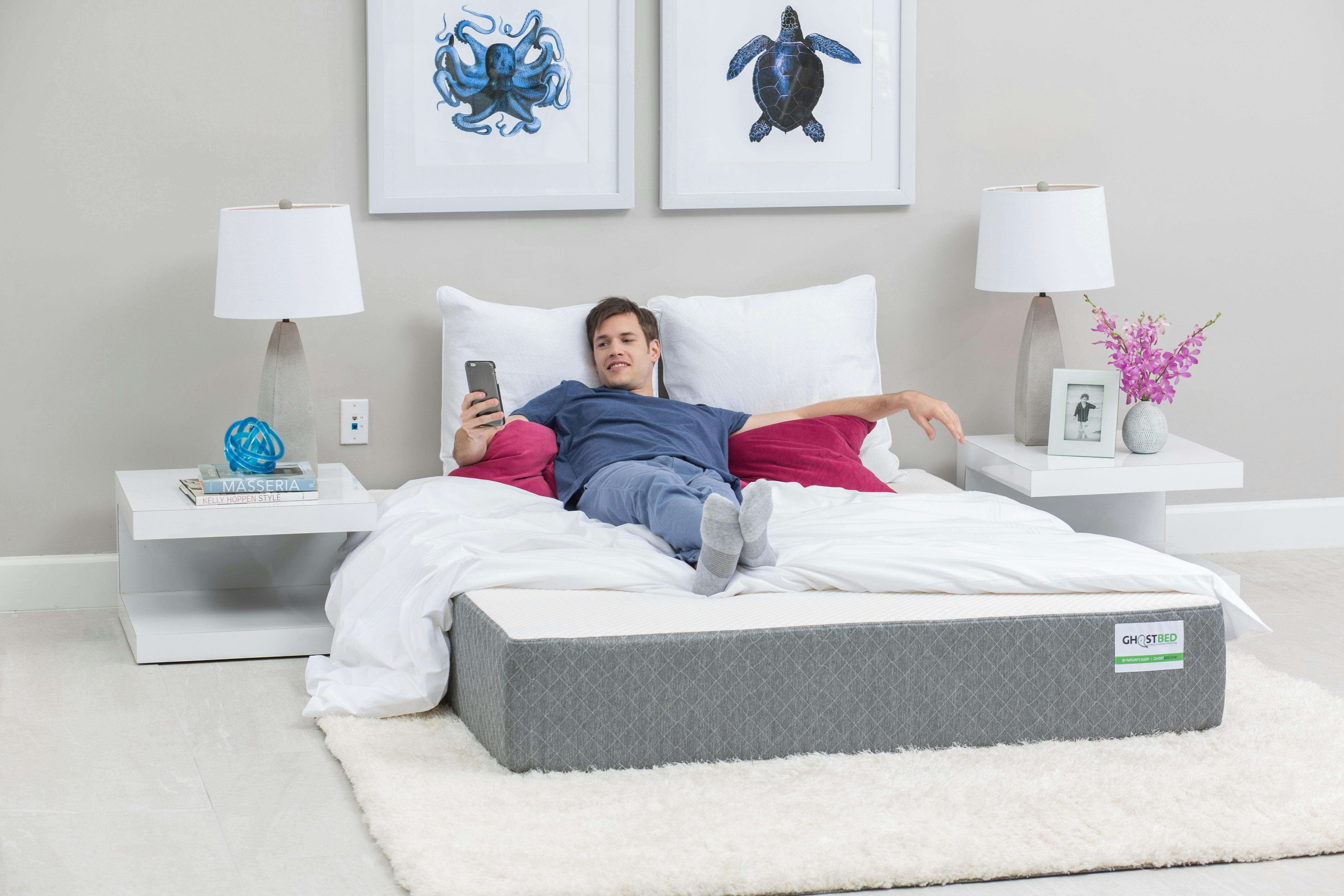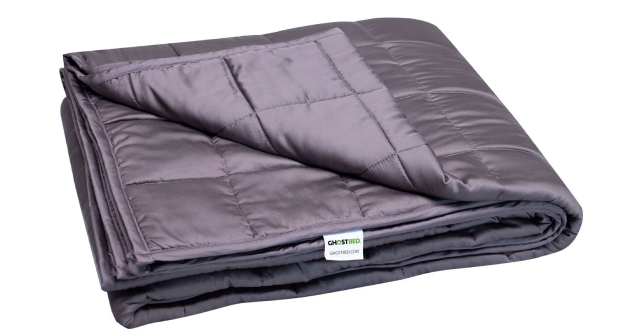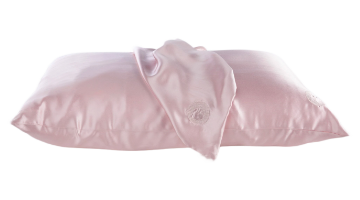How to Choose a Mattress Type: Memory Foam, Latex, Innerspring, Hybrid
Last Updated on April 9, 2025
by Marc Werner, Founder - GhostBed
How to choose a mattress is determined on individual needs and wants, along with budget. The world of mattress choices is ever changing with new materials and technology. Most people generally hold onto a mattress for a lot longer than the 7 – 10 years that experts advise for replacing beds. Once you decide to buy a new mattress you will most likely be faced with many new choices since the last time you went bed buying.

I. Determine Mattress Type Desired
II. Desired Firmness
III. Sleep Position
IV. Budget to Buy a Mattress
V. Picking the Right Mattress
I. Determine Mattress Type Desired
Where there was once a choice of the most common being innerspring, along with the rare memory foam, and the once popular water bed, there are now many more choices. Mattress companies are stepping up their game by providing new innovative choices of memory foam infused with gel for cooling, comfortable pillow tops, and hybrids using a combination of two or three types of popular mattress choice materials.
Innerspring
An innerspring mattress is the traditional mattress and once the most commonly chosen of mattress types. This bed uses steel coils bundled together to support the body lying on it. The springs work to offer help in the distribution of the weight of the body as it moves. Different types of innerspring coils include typical Bonnell hourglass shaped coils tied together, independent free-moving coils, and continuous coils.
The coils are surrounded by upholstered layers of fabric covering that helps with providing a soft cushion surface to sleep upon. For optimal support, it is often suggested that the innerspring mattress should be bought with its box-spring mate for its base.
Memory Foam
Memory foam have become a very popular choice for a new mattress. The unique viscoelastic polyurethane foam was invented by NASA in the 1970s as a cushion to protect astronauts from the g-force impact experienced during lift off. A Swedish foam producing company took notice and fashioned the first memory foam beds launched in the 1990s.
Quickly the new memory foam mattresses attracted fans for their wonderful ability to contour and offer support for the entire body, thus relieving pressure that cause aches and pains. The down side from the first memory foam beds were that they seemed to run hot, therefore making for hot nights and loss of sleep.
Manufacturers have improved the memory foam technology. Modern advanced memory foam mattresses, now on the market, have incorporated cooling layers that allow for a cool sleep. The cool sleep, along with the pressure relieving body support, makes the memory foam mattress the bed of choice for most of today’s mattress shoppers.
Latex
Latex mattresses are gaining in popularity for their organic appeal of being made from a natural rubber plant. They are naturally cooling and comfortable, similar to the memory foam mattress type. The latex foam contours to the body but in a more responsive way than a hug, while also offering bounce. Latex is often combined with memory foam to be used in hybrid beds.
Hybrid
A hybrid mattress is just what it sounds like. It is a hybrid, or combination of several types of bedding. A common hybrid choice is that of latex with memory foam. This allows for a bed that will contour the body like memory foam but give the firmer bounce of latex.
Other hybrids include combining coil and foam. Hybrids are all about taking the best qualities of each mattress type to combine them to make the ultimate comfort in a mattress choice. A pillow top can also be considered a hybrid when crafted from a different material than the mattress to provide an extra layer of cushiony support for the body.
II. Positions for Back Sleepers and What They Mean
The Soldier
This is the person who is always at attention, whether awake or asleep.
The soldier will sleep flat on the back, holding arms straight to sides of the body, and legs straight together as well. Unfortunately for those who share a bed, this position tends to promote snoring. Not only will the snoring disturb a bed mate but it could also impede the quality of sleep for the soldier causing difficulty with breathing. Apart from the snoring issue, this position is considered to be the best to prevent back pain. It has been found that only eight percent of people prefer the soldier sleeping position.
Soldier sleepers tend to be reserved individuals who are quiet. Just as a soldier, they expect of themselves and others to keep to a higher standard of performance.
The Starfish
Starfish sleepers are named for the creature of the sea who lies on the sand appearing like a five-pointed star.
The starfish sleeper is one who lies flat on their back, but more relaxed than the soldier, with arms spread out raised laying loosely around the head. The legs are spread apart and relaxed as they extend from body. Just like the soldier, starfish sleepers tend to snore and have issues with breathing during sleep. Even less people are prone to sleep like the starfish with studies indicating only five-percent sleep in this position.
These sleepers are seen as good friends for their quality as wonderful listeners and always eager to help. The starfish like to be in the background rather than being the center of attention.
III. Back Sleeping Tips
- It is important to have your head elevated properly when sleeping on the back. This will help to avert any acid reflux distress. With the head raised, gravity allows for the stomach to sit below the esophagus, keeping any acid from food coming up to the throat to cause discomfort.
- Be careful to make sure all the pressure points in the body are equally supported. You will want a firm mattress that gives to allow cradling of all points of the body resting on the surface. Consider adding a mattress cover or topper to a very firm mattress, or to top an older bed.
- Although researchers have found that sleeping on the back is the best for back pain, adding a roll pillow behind the knees, to assure that your spine lies flat against the mattress, will help to prevent lower back pain.
- Research shows that sleeping on your back may lead to snoring, difficulty breathing, and an overall bad night’s sleep. Is your snoring keeping someone awake at night? Try flipping over—you’ll both wake up more refreshed.
IV. Back Sleeping FAQ's
How can I teach myself to sleep on my back?
The body can be taught to change habits with a little work and persistence. Use extra pillows to keep you in place by positioning them on either side to prevent you from turning over. Experts state that placing a pillow under each arm will work best.
What type of pillow is best for a back sleeper?
Back sleepers need a pillow that has an adjustable loft, or thickness, but is also firm. This allows the pillows to be pliable so that you can mold it to where you need the best support, such as under the neck, to keep the alignment of the head and neck even for preventing pain.
Are there any accessories that will help with sleeping on the back?
You can spend the money for an adjustable base for your bed into to adjust it for lounging in the back position. Also available are bed wedges. These are wonderful pillow type of accessories that can be stacked and positioned to get the most comfortable sleep in the back position.
IV. GhostBed Back Sleeper Reviews
In addition to proper pillows, back sleepers must get the proper support from a not too firm, but not too soft mattress, to allow for the ultimate of support needed. Memory foam mattresses have shown to be the best mattress for back pain. Accordingly, the memory foam is firm, but also contouring to provide the ultimate in support. Without the proper recipe for support, the spine could get misaligned and back sleepers could wake sore with back pain.
GhostBed is an ideal mattress for back sleepers, with real customers reviewing their experience.
Marc has spent the last two decades designing & manufacturing mattresses and other sleep products, drawing on a lifetime of experience working with the material sciences. With several patents to his name, he works closely with the GhostBed team to create products with the perfect balance of comfort & support. Learn More




